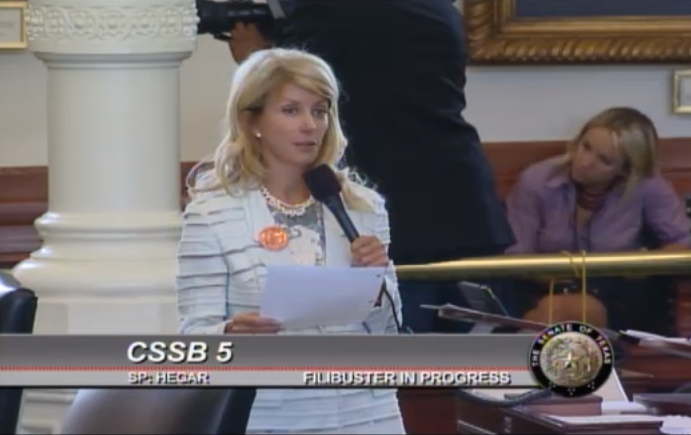UPDATE: This article was published at the same time that Texas Senator Wendy Davis (above) was filibustering a bill in Texas that would have placed the most restrictive limitations on abortion in any state in the country. She succeeded. As of midnight this morning, the bill was dead.
As I write, Wendy Davis, a state senator from Fort Worth, is standing on the floor of the Texas Senate filibustering an extremist anti-abortion-rights bill passed by an overwhelming Republican majority after Governor Rick Perry added it to the special session call.
The session ends at midnight tonight (June 25). If Davis holds on, she will kill the bill.
Davis is everything Republicans fear.
The daughter of a single mother and a single mother herself at 19, Davis studied at a community college to become a paralegal, graduated first in her class at Texas Christian University, then graduated with honors from Harvard Law School. She is eloquent, telegenic, and smart. She’s also a white woman who swept the black and Hispanic vote in her senate district.
Here’s the deal.
Davis would not be standing on the floor today without Article 5 of the Voting Rights Act, which the Supreme Court, by a 5-4 vote, today declared unconstitutional.
| Chief Justice John Roberts and the four associate justices who overturned Section 5 of the Voting Rights Act know that in Southern jurisdictions “black” is synonymous with “Democrat.” |
In 2011, the Republican Texas Legislature engaged in unabashed act of ethnic cleansing, carving black and Hispanic precincts out of Davis’s district to create a conservative white electorate that would fit Kim Brimer, a cigar-chomping, silver-haired good-old-boy who has been a fixture in the Texas Lege since he showed up to represent the state’s business community in 1989.
Because Texas was required to pre-clear all changes in voting laws with the U.S. Justice Department or a three-judge panel in federal district court in Washington, D.C., Wendy Davis is on the floor of the Texas Senate today. The judges ruled that the Legislature had diluted the minority vote in her district and ordered it redrawn. But gerrymandering doesn’t stop in Texas.
Ernest Montgomery is the only African-American council member representing the City of Calera, Alabama. In 2008, while he was in office, the Calera City Council redrew the city’s traditional black district, in which he had been easily elected in the previous election.
In redrawing the map, Montgomery’s white colleagues reduced the African-American population of his district from 69 percent to 29 percent. In August 2008, Montgomery’s white opponent defeated him in a close election.
When I interviewed Montgomery in December, he told me he had assumed that the Justice Department had pre-cleared the city’s new voting maps. Only after the election did the city attorney tell Montgomery that Justice had refused to pre-clear Calera’s maps.
Under Section 5 of the Voting Rights Act, the elections were voided and Montgomery became a protagonist in his own story. He traveled to Washington with the mayor and the city attorney to negotiate a solution that would be acceptable to him and the African-American voters of Calera.
The solution was six single-member districts in which voters would have one vote per district and could choose to cast all of them for one candidate. The cumulative voting allowed Calera’s 23-percent black minority community to cast all their votes for one candidate. In a second election held in 2009, Montgomery was reelected to one of the new at-large seats.
On the day before I interviewed Montgomery, Bobby Lee Harris told me a similar story.
Harris represented the historically African-American district in Alabaster, a small town 16 miles north of Calera. In 2000, the Alabaster City Council redrew the city’s electoral maps, adding a large new white subdivision to the district Harris represented. Because the city had filed its Section 5 preclearance petition late, the Justice Department was late in refusing to pre-clear the changes and the election was held—with the votes from the Waverly Subdivision voided.
On election night, Harris lost 387-326—until the nullified votes were subtracted from the tally. All 99 voters in the white subdivision had voted for Harris’s white challenger. “I stayed on the council for four more years,” Harris told me. “If it hadn’t been for Section 5, I would have been off the council in 2000.”
Chief Justice John Roberts and the four associate justices who overturned Section 5 of the Voting Rights Act—which Congress extended for 25 years in 2007 by a 98,0 vote in the Senate and a 390-33 vote in the House—know that in Alabama and other Southern jurisdictions “black” is synonymous with “Democrat.”
They also know that is extremely rare that white Republicans invoke Section 5 to claim their districts were gerrymandered to accommodate black or Hispanic voters.
In this sense, the Supreme Court justices are behaving more like putschists than jurists, overthrowing elected minority representatives and locking in conservative Republican rule for another 20 years.
Lou Dubose is the editor of The Washington Spectator.







0 Comments